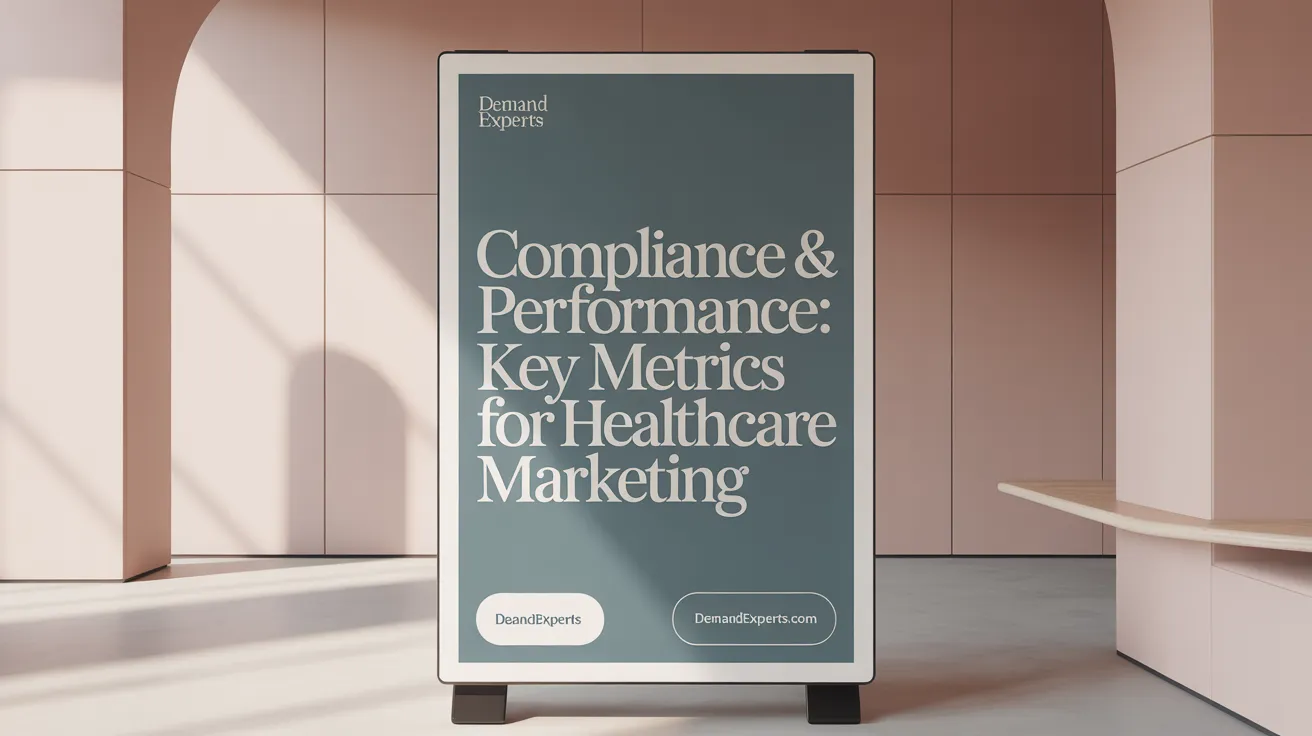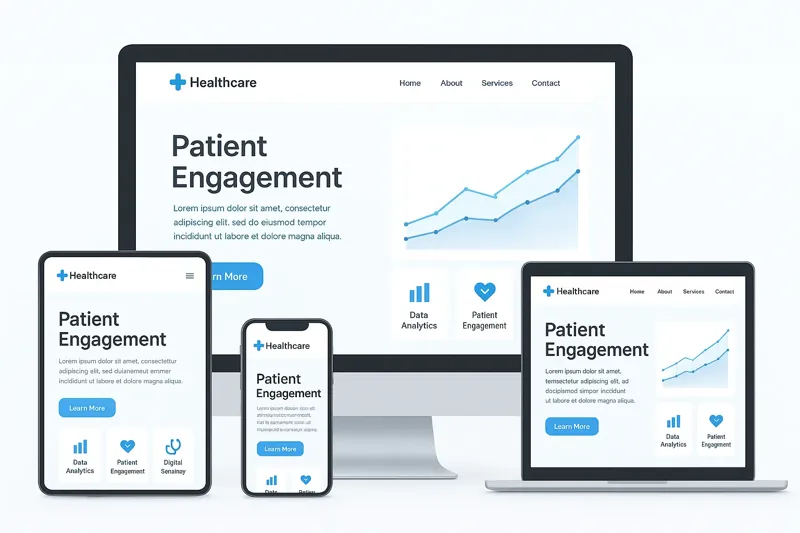The Complex Landscape of Healthcare Digital Marketing Compliance
Healthcare digital marketing is a powerful tool for patient engagement, acquisition, and retention. However, it operates within a highly regulated environment that presents unique challenges to marketers. Navigating laws like HIPAA, FDA regulations, FTC guidelines, and GDPR is vital to protecting patient privacy, maintaining trust, and avoiding costly penalties. This article explores key legal frameworks, privacy impacts, ethical marketing practices, and strategic approaches to compliant healthcare digital marketing campaigns.
Key Laws and Regulatory Frameworks in Healthcare Digital Marketing

In healthcare digital marketing, understanding the complex landscape of laws and standards is essential for compliance and trust. Several key regulations govern how organizations can communicate with patients and the public.
Firstly, the Health Insurance Portability and Accountability Act (HIPAA) sets strict rules for the privacy and security of Protected Health Information (PHI). It restricts the use and disclosure of PHI in marketing activities without explicit patient authorization, requiring secure handling, encryption, and signed Business Associate Agreements (BAAs) with third parties (HIPAA marketing rules, HIPAA marketing compliance, HIPAA and marketing compliance).
Secondly, the General Data Protection Regulation (GDPR)—effective across the European Union—impacts organizations handling data of EU residents. It emphasizes transparency, explicit consent, data minimization, and individuals’ rights to access and delete their data. Complying with GDPR involves clear privacy notices, consent protocols, and secure data practices.
The Federal Trade Commission (FTC) enforces standards against deceptive, unfair, or misleading marketing practices. Claims in healthcare advertisements must be substantiated with scientific evidence, and endorsements must accurately reflect typical outcomes. Clear disclosures about sponsorships and conflicts of interest are also required (Federal Trade Commission healthcare advertising rules).
Additionally, the Food and Drug Administration (FDA) oversees advertising for healthcare products such as drugs and medical devices. It mandates truthful, balanced claims supported by scientific data, with specific guidelines for digital content, including social media, websites, and promotional materials (FDA prescription drug advertisement guidelines, FDA advertising and promotion guidance, FDA social media promotion guidelines).
CMS rules affect advertising related to Medicare and Medicaid by requiring truthful, non-misleading information that discloses limitations or restrictions. State and local regulations can impose further requirements, especially regarding privacy, data security, and healthcare advertising practices (Medicare and Medicaid ad regulations, State and local healthcare advertising laws).
Beyond legal requirements, voluntary standards like ISO certifications and accreditation from organizations like The Joint Commission often promote higher quality practices, exceeding minimum legal obligations. These standards support continuous improvement, patient safety, and organizational credibility.
To navigate this environment, healthcare organizations should invest in staff training, utilize compliant digital tools, maintain transparent privacy policies, and ensure third-party vendors are also compliant. Proactive monitoring and regular compliance audits help prevent violations that could lead to fines, legal action, or damage to reputation (Compliance in healthcare advertising, Healthcare compliance laws).
Overall, adherence to these overlapping laws and standards is crucial for trustworthy and ethical digital marketing in healthcare. Carefully integrated compliance strategies not only mitigate risks but also foster patient trust and loyalty.
Privacy and Data Protection: Navigating HIPAA and GDPR in Digital Marketing

How do privacy and data protection regulations impact healthcare digital marketing efforts?
Privacy and data protection laws such as HIPAA and GDPR privacy standards profoundly shape how healthcare organizations conduct digital marketing. HIPAA mandates that protected health information (PHI) must be safeguarded through stringent security controls, including encryption and access restrictions. Marketers need explicit patient authorization before using PHI in campaigns and must establish Business Associate Agreements (BAAs) with vendors handling sensitive data.
GDPR adds further emphasis on transparency, requiring clear communication about data collection, explicit consent, and giving individuals rights to access or delete their data. This means healthcare marketers must develop comprehensive privacy notices, honor opt-in preferences, and ensure that personal data is only used within the scope authorized by patients.
Implementing principles like privacy by design involves integrating security features such as data encryption, secure transmission protocols, and staff training. Regular audits are essential to identify and rectify vulnerabilities, preventing breaches and penalties.
Overall, these regulations compel healthcare marketers to adopt ethical, transparent, and secure data practices. This approach not only avoids legal repercussions but also fosters patient trust, enabling effective outreach while respecting individual rights.
Best Practices for Legal and Ethical Compliance in Healthcare Marketing
What are best practices for ensuring legal and ethical compliance in healthcare digital marketing campaigns?
Ensuring compliance in healthcare marketing requires a rigorous approach to protecting patient privacy and adhering to legal standards. First, organizations must obtain explicit, written patient consent before using or disclosing protected health information (PHI) for marketing purposes. This involves clear authorization forms that specify what information is used, how it is shared, and whether remuneration is involved (Marketing Involving Protected Health Information (PHI), HIPAA Privacy Rule marketing limits, HIPAA marketing rules).
Using secure, encrypted communication platforms is essential to keep PHI protected during electronic exchanges. Facilities should employ industry-standard encryption protocols such as TLS and AES 256-bit encryption for email, messaging, and online forms (HIPAA compliant marketing, HIPAA compliance in digital marketing). Signing Business Associate Agreements (BAAs) with vendors and third-party service providers ensures contractual responsibility for safeguarding PHI (HIPAA marketing compliance, HIPAA compliance for digital marketing).
It's critical to avoid sharing identifiable PHI on public platforms like social media, websites, or email campaigns—unless proper authorization is secured. Instead, marketers should focus on educational content, general health tips, and awareness initiatives that do not include personally identifiable information (Healthcare Marketing Compliance, Healthcare advertising compliance, HIPAA and marketing compliance).
Staff training plays a vital role in maintaining compliance. Regular education sessions and updates on HIPAA and GDPR regulations help staff recognize sensitive content and utilize compliant marketing practices. Routine audits of campaigns and digital tools help identify and mitigate potential risks (Healthcare marketing compliance, Healthcare compliance policies and training, Healthcare marketing compliance friendly digital strategies).
The use of HIPAA-compliant tools and analytics platforms is a best practice—platforms like secure customer data platforms (CDPs), HIPAA-compatible web analytics, and marketing automation tools help monitor performance without risking privacy violations (Healthcare Marketers Winning with Compliance, HIPAA marketing rules and compliant platforms, HIPAA compliant digital marketing). Transparent privacy policies should be maintained on websites to inform users about data collection and use (Healthcare Marketing Compliance).
Lastly, all marketing materials, including patient testimonials and success stories, should be reviewed by legal teams to ensure proper consent and compliance. Regular legal reviews and updates of policies create a strong foundation for ethically responsible healthcare marketing practices (Truth in Advertising Campaign, Healthcare marketing compliance, Healthcare advertising compliance).
By integrating these practices, healthcare organizations can uphold legal standards, protect patient trust, and deliver ethical, compliant digital marketing campaigns that foster long-term relationships with their audience (Healthcare compliance overview, Navigating Compliance in Digital Healthcare Advertising).
Developing Compliant Digital Marketing Strategies for Healthcare Organizations
How should healthcare organizations develop digital marketing strategies that comply with legal and regulatory requirements?
Healthcare organizations aiming to create effective yet compliant digital marketing strategies need to embed compliance checks at every stage, from initial planning to campaign execution. This involves collaborating with legal and compliance experts to interpret laws such as HIPAA regulations, FDA prescription drug advertisement guidelines, and advertising standards including the Federal Trade Commission healthcare advertising rules.
Utilizing compliant educational content is essential; all claims should be supported by scientific evidence and free from unapproved or misleading statements. Content must also steer clear of making guarantees or exaggerations that could violate healthcare advertising regulations.
Staff involved in marketing activities should undergo regular training on relevant standards to understand legal boundaries and prevent inadvertent violations. This reduces risk and fosters a culture of compliance as promoted by Healthcare Marketing Compliance.
Privacy-conscious targeting methods, such as contextual advertising that does not rely on sensitive personally identifiable information (PII), help target audiences lawfully. Strategies like using deterministically-verified non-PII data enable precise outreach without breaching patient confidentiality, aligned with HIPAA and GDPR privacy standards.
Continuous monitoring of regulations and industry updates is vital. Healthcare marketers should stay informed about changes through regulatory updates and guidance documents, updating their privacy policies routinely.
To evaluate campaign success legally, employing measurement tools like brand lift studies helps assess effectiveness without compromising compliance. These studies provide insights into brand awareness and engagement, supporting strategic adjustments as recommended by evaluation of digital data in public health.
In summary, the development of compliant digital marketing strategies involves a harmonious blend of expert consultation, accurate content, staff training, privacy-aware targeting, ongoing regulatory vigilance, and effective measurement—ensuring campaigns are both effective and within legal bounds.
Legal and Ethical Restrictions in Healthcare Social Media Advertising

What legal and ethical restrictions should be considered when advertising healthcare products and services on social media?
When promoting healthcare products and services on social media, organizations must carefully navigate a variety of legal and ethical restrictions. These include safeguarding patient confidentiality by avoiding the disclosure of Protected Health Information (PHI), in line with HIPAA privacy standards. Marketers should ensure that all claims are truthful and backed by scientific evidence, adhering to FDA prescription drug advertisement guidelines for medical products, and Federal Trade Commission healthcare advertising rules for truthful advertising.
Compliance with state-specific medical board regulations is also crucial, as these state and local healthcare advertising laws may impose additional restrictions on promotional activities. Healthcare providers must avoid promoting unproven or experimental treatments unless supported by proper approval, and they should always obtain explicit patient consent for testimonials or individual case stories used in marketing.
Platforms like Facebook and other social media channels treat health topics as sensitive categories, requiring stricter targeting restrictions. This often means that marketers cannot use detailed personal data for ad targeting without proper consent or must implement broader demographic targeting, consistent with HIPAA marketing rules and FDA social media promotion guidelines.
To maintain ethical standards, organizations should develop comprehensive social media policies, ensure staff and influencers are trained on appropriate messaging and legal obligations, and seek legal counsel when needed. Regular audits and updated training on data privacy, truthfulness, and platform-specific policies help prevent violations and foster trust with potential patients, as outlined in Healthcare Marketing Compliance: Key Strategies for Success and Navigating FDA and HIPAA Regulations in Social Media Marketing.
In summary, ethical healthcare social media advertising must prioritize patient privacy, provide accurate information, follow platform rules, and involve trained personnel aware of both legal requirements and best practices.
Evaluating Healthcare Digital Marketing Campaigns for Compliance and Performance

Healthcare digital marketing campaigns require careful evaluation to ensure they meet both regulatory standards and achieve their strategic goals. First and foremost, compliance audits are essential. These audits verify adherence to laws such as HIPAA by confirming that Protected Health Information (PHI) is not used without explicit patient consent and that all data handling practices are secure and compliant with HIPAA’s privacy and security rules.
To avoid legal issues, campaigns should steer clear of using PHI unless proper authorization has been obtained. Instead, they should focus on non-PHI metrics like website traffic, click-through rates, social media engagement, and survey feedback. These indicators provide valuable insights into patient interest and engagement without risking privacy violations, aligned with guidance on Healthcare digital advertising strategies and Digital Marketing in Healthcare.
Legal reviews by compliance officers or legal counsel further safeguard campaigns, especially when targeting multiple states with varying regulations, following Healthcare Regulatory Compliance and Healthcare compliance laws. Standardized processes streamline compliance—such as having pre-approved templates and routine checks—making it easier to manage multi-state campaigns efficiently.
Analytics tools are vital for performance measurement. Platforms that track engagement through anonymous data, QR code scans, or link clicks enable marketers to evaluate reach and interest levels without compromising patient confidentiality, complying with HIPAA marketing regulations and HIPAA compliant digital marketing.
By observing content interaction, remarketing effectiveness, and patient feedback, organizations can identify what resonates with their audience while maintaining strict privacy standards. This approach not only optimizes campaign strategies but also reduces legal and ethical risks, consistent with best practices for Healthcare marketing compliance and Healthcare advertising compliance.
Ultimately, combining rigorous compliance management with detailed, non-PHI performance metrics ensures healthcare marketing initiatives are both effective and ethically sound. Achieving this balance fosters trust with patients, enhances brand reputation, and keeps organizations aligned with complex healthcare regulations as outlined in Healthcare Marketing Compliance and Healthcare compliance overview.
Building a Culture of Compliance for Sustainable Healthcare Marketing Success
Healthcare digital marketing is an indispensable tool for modern healthcare organizations, yet it demands meticulous adherence to a complex web of legal, ethical, and regulatory requirements. Organizations must embrace a proactive approach that integrates rigorous compliance with innovative yet responsible marketing tactics. By prioritizing patient privacy through HIPAA and GDPR standards, adhering to FDA and FTC advertising mandates, and implementing ongoing staff education and audits, healthcare marketers can build trust and foster lasting patient relationships. Leveraging compliance to optimize campaigns not only protects organizations from legal risks but also enhances credibility and engagement. Staying vigilant amid evolving regulations, adopting advanced compliance-friendly technologies, and fostering collaboration among legal, clinical, and marketing teams will empower healthcare marketers to navigate this challenging landscape successfully, ultimately delivering impactful and compliant digital marketing campaigns.
The Complex Landscape of Healthcare Digital Marketing Compliance
Healthcare digital marketing is a powerful tool for patient engagement, acquisition, and retention. However, it operates within a highly regulated environment that presents unique challenges to marketers. Navigating laws like HIPAA, FDA regulations, FTC guidelines, and GDPR is vital to protecting patient privacy, maintaining trust, and avoiding costly penalties. This article explores key legal frameworks, privacy impacts, ethical marketing practices, and strategic approaches to compliant healthcare digital marketing campaigns.
Key Laws and Regulatory Frameworks in Healthcare Digital Marketing

In healthcare digital marketing, understanding the complex landscape of laws and standards is essential for compliance and trust. Several key regulations govern how organizations can communicate with patients and the public.
Firstly, the Health Insurance Portability and Accountability Act (HIPAA) sets strict rules for the privacy and security of Protected Health Information (PHI). It restricts the use and disclosure of PHI in marketing activities without explicit patient authorization, requiring secure handling, encryption, and signed Business Associate Agreements (BAAs) with third parties (HIPAA marketing rules, HIPAA marketing compliance, HIPAA and marketing compliance).
Secondly, the General Data Protection Regulation (GDPR)—effective across the European Union—impacts organizations handling data of EU residents. It emphasizes transparency, explicit consent, data minimization, and individuals’ rights to access and delete their data. Complying with GDPR involves clear privacy notices, consent protocols, and secure data practices.
The Federal Trade Commission (FTC) enforces standards against deceptive, unfair, or misleading marketing practices. Claims in healthcare advertisements must be substantiated with scientific evidence, and endorsements must accurately reflect typical outcomes. Clear disclosures about sponsorships and conflicts of interest are also required (Federal Trade Commission healthcare advertising rules).
Additionally, the Food and Drug Administration (FDA) oversees advertising for healthcare products such as drugs and medical devices. It mandates truthful, balanced claims supported by scientific data, with specific guidelines for digital content, including social media, websites, and promotional materials (FDA prescription drug advertisement guidelines, FDA advertising and promotion guidance, FDA social media promotion guidelines).
CMS rules affect advertising related to Medicare and Medicaid by requiring truthful, non-misleading information that discloses limitations or restrictions. State and local regulations can impose further requirements, especially regarding privacy, data security, and healthcare advertising practices (Medicare and Medicaid ad regulations, State and local healthcare advertising laws).
Beyond legal requirements, voluntary standards like ISO certifications and accreditation from organizations like The Joint Commission often promote higher quality practices, exceeding minimum legal obligations. These standards support continuous improvement, patient safety, and organizational credibility.
To navigate this environment, healthcare organizations should invest in staff training, utilize compliant digital tools, maintain transparent privacy policies, and ensure third-party vendors are also compliant. Proactive monitoring and regular compliance audits help prevent violations that could lead to fines, legal action, or damage to reputation (Compliance in healthcare advertising, Healthcare compliance laws).
Overall, adherence to these overlapping laws and standards is crucial for trustworthy and ethical digital marketing in healthcare. Carefully integrated compliance strategies not only mitigate risks but also foster patient trust and loyalty.
Privacy and Data Protection: Navigating HIPAA and GDPR in Digital Marketing

How do privacy and data protection regulations impact healthcare digital marketing efforts?
Privacy and data protection laws such as HIPAA and GDPR privacy standards profoundly shape how healthcare organizations conduct digital marketing. HIPAA mandates that protected health information (PHI) must be safeguarded through stringent security controls, including encryption and access restrictions. Marketers need explicit patient authorization before using PHI in campaigns and must establish Business Associate Agreements (BAAs) with vendors handling sensitive data.
GDPR adds further emphasis on transparency, requiring clear communication about data collection, explicit consent, and giving individuals rights to access or delete their data. This means healthcare marketers must develop comprehensive privacy notices, honor opt-in preferences, and ensure that personal data is only used within the scope authorized by patients.
Implementing principles like privacy by design involves integrating security features such as data encryption, secure transmission protocols, and staff training. Regular audits are essential to identify and rectify vulnerabilities, preventing breaches and penalties.
Overall, these regulations compel healthcare marketers to adopt ethical, transparent, and secure data practices. This approach not only avoids legal repercussions but also fosters patient trust, enabling effective outreach while respecting individual rights.
Best Practices for Legal and Ethical Compliance in Healthcare Marketing
What are best practices for ensuring legal and ethical compliance in healthcare digital marketing campaigns?
Ensuring compliance in healthcare marketing requires a rigorous approach to protecting patient privacy and adhering to legal standards. First, organizations must obtain explicit, written patient consent before using or disclosing protected health information (PHI) for marketing purposes. This involves clear authorization forms that specify what information is used, how it is shared, and whether remuneration is involved (Marketing Involving Protected Health Information (PHI), HIPAA Privacy Rule marketing limits, HIPAA marketing rules).
Using secure, encrypted communication platforms is essential to keep PHI protected during electronic exchanges. Facilities should employ industry-standard encryption protocols such as TLS and AES 256-bit encryption for email, messaging, and online forms (HIPAA compliant marketing, HIPAA compliance in digital marketing). Signing Business Associate Agreements (BAAs) with vendors and third-party service providers ensures contractual responsibility for safeguarding PHI (HIPAA marketing compliance, HIPAA compliance for digital marketing).
It's critical to avoid sharing identifiable PHI on public platforms like social media, websites, or email campaigns—unless proper authorization is secured. Instead, marketers should focus on educational content, general health tips, and awareness initiatives that do not include personally identifiable information (Healthcare Marketing Compliance, Healthcare advertising compliance, HIPAA and marketing compliance).
Staff training plays a vital role in maintaining compliance. Regular education sessions and updates on HIPAA and GDPR regulations help staff recognize sensitive content and utilize compliant marketing practices. Routine audits of campaigns and digital tools help identify and mitigate potential risks (Healthcare marketing compliance, Healthcare compliance policies and training, Healthcare marketing compliance friendly digital strategies).
The use of HIPAA-compliant tools and analytics platforms is a best practice—platforms like secure customer data platforms (CDPs), HIPAA-compatible web analytics, and marketing automation tools help monitor performance without risking privacy violations (Healthcare Marketers Winning with Compliance, HIPAA marketing rules and compliant platforms, HIPAA compliant digital marketing). Transparent privacy policies should be maintained on websites to inform users about data collection and use (Healthcare Marketing Compliance).
Lastly, all marketing materials, including patient testimonials and success stories, should be reviewed by legal teams to ensure proper consent and compliance. Regular legal reviews and updates of policies create a strong foundation for ethically responsible healthcare marketing practices (Truth in Advertising Campaign, Healthcare marketing compliance, Healthcare advertising compliance).
By integrating these practices, healthcare organizations can uphold legal standards, protect patient trust, and deliver ethical, compliant digital marketing campaigns that foster long-term relationships with their audience (Healthcare compliance overview, Navigating Compliance in Digital Healthcare Advertising).
Developing Compliant Digital Marketing Strategies for Healthcare Organizations
How should healthcare organizations develop digital marketing strategies that comply with legal and regulatory requirements?
Healthcare organizations aiming to create effective yet compliant digital marketing strategies need to embed compliance checks at every stage, from initial planning to campaign execution. This involves collaborating with legal and compliance experts to interpret laws such as HIPAA regulations, FDA prescription drug advertisement guidelines, and advertising standards including the Federal Trade Commission healthcare advertising rules.
Utilizing compliant educational content is essential; all claims should be supported by scientific evidence and free from unapproved or misleading statements. Content must also steer clear of making guarantees or exaggerations that could violate healthcare advertising regulations.
Staff involved in marketing activities should undergo regular training on relevant standards to understand legal boundaries and prevent inadvertent violations. This reduces risk and fosters a culture of compliance as promoted by Healthcare Marketing Compliance.
Privacy-conscious targeting methods, such as contextual advertising that does not rely on sensitive personally identifiable information (PII), help target audiences lawfully. Strategies like using deterministically-verified non-PII data enable precise outreach without breaching patient confidentiality, aligned with HIPAA and GDPR privacy standards.
Continuous monitoring of regulations and industry updates is vital. Healthcare marketers should stay informed about changes through regulatory updates and guidance documents, updating their privacy policies routinely.
To evaluate campaign success legally, employing measurement tools like brand lift studies helps assess effectiveness without compromising compliance. These studies provide insights into brand awareness and engagement, supporting strategic adjustments as recommended by evaluation of digital data in public health.
In summary, the development of compliant digital marketing strategies involves a harmonious blend of expert consultation, accurate content, staff training, privacy-aware targeting, ongoing regulatory vigilance, and effective measurement—ensuring campaigns are both effective and within legal bounds.
Legal and Ethical Restrictions in Healthcare Social Media Advertising

What legal and ethical restrictions should be considered when advertising healthcare products and services on social media?
When promoting healthcare products and services on social media, organizations must carefully navigate a variety of legal and ethical restrictions. These include safeguarding patient confidentiality by avoiding the disclosure of Protected Health Information (PHI), in line with HIPAA privacy standards. Marketers should ensure that all claims are truthful and backed by scientific evidence, adhering to FDA prescription drug advertisement guidelines for medical products, and Federal Trade Commission healthcare advertising rules for truthful advertising.
Compliance with state-specific medical board regulations is also crucial, as these state and local healthcare advertising laws may impose additional restrictions on promotional activities. Healthcare providers must avoid promoting unproven or experimental treatments unless supported by proper approval, and they should always obtain explicit patient consent for testimonials or individual case stories used in marketing.
Platforms like Facebook and other social media channels treat health topics as sensitive categories, requiring stricter targeting restrictions. This often means that marketers cannot use detailed personal data for ad targeting without proper consent or must implement broader demographic targeting, consistent with HIPAA marketing rules and FDA social media promotion guidelines.
To maintain ethical standards, organizations should develop comprehensive social media policies, ensure staff and influencers are trained on appropriate messaging and legal obligations, and seek legal counsel when needed. Regular audits and updated training on data privacy, truthfulness, and platform-specific policies help prevent violations and foster trust with potential patients, as outlined in Healthcare Marketing Compliance: Key Strategies for Success and Navigating FDA and HIPAA Regulations in Social Media Marketing.
In summary, ethical healthcare social media advertising must prioritize patient privacy, provide accurate information, follow platform rules, and involve trained personnel aware of both legal requirements and best practices.
Evaluating Healthcare Digital Marketing Campaigns for Compliance and Performance

Healthcare digital marketing campaigns require careful evaluation to ensure they meet both regulatory standards and achieve their strategic goals. First and foremost, compliance audits are essential. These audits verify adherence to laws such as HIPAA by confirming that Protected Health Information (PHI) is not used without explicit patient consent and that all data handling practices are secure and compliant with HIPAA’s privacy and security rules.
To avoid legal issues, campaigns should steer clear of using PHI unless proper authorization has been obtained. Instead, they should focus on non-PHI metrics like website traffic, click-through rates, social media engagement, and survey feedback. These indicators provide valuable insights into patient interest and engagement without risking privacy violations, aligned with guidance on Healthcare digital advertising strategies and Digital Marketing in Healthcare.
Legal reviews by compliance officers or legal counsel further safeguard campaigns, especially when targeting multiple states with varying regulations, following Healthcare Regulatory Compliance and Healthcare compliance laws. Standardized processes streamline compliance—such as having pre-approved templates and routine checks—making it easier to manage multi-state campaigns efficiently.
Analytics tools are vital for performance measurement. Platforms that track engagement through anonymous data, QR code scans, or link clicks enable marketers to evaluate reach and interest levels without compromising patient confidentiality, complying with HIPAA marketing regulations and HIPAA compliant digital marketing.
By observing content interaction, remarketing effectiveness, and patient feedback, organizations can identify what resonates with their audience while maintaining strict privacy standards. This approach not only optimizes campaign strategies but also reduces legal and ethical risks, consistent with best practices for Healthcare marketing compliance and Healthcare advertising compliance.
Ultimately, combining rigorous compliance management with detailed, non-PHI performance metrics ensures healthcare marketing initiatives are both effective and ethically sound. Achieving this balance fosters trust with patients, enhances brand reputation, and keeps organizations aligned with complex healthcare regulations as outlined in Healthcare Marketing Compliance and Healthcare compliance overview.
Building a Culture of Compliance for Sustainable Healthcare Marketing Success
Healthcare digital marketing is an indispensable tool for modern healthcare organizations, yet it demands meticulous adherence to a complex web of legal, ethical, and regulatory requirements. Organizations must embrace a proactive approach that integrates rigorous compliance with innovative yet responsible marketing tactics. By prioritizing patient privacy through HIPAA and GDPR standards, adhering to FDA and FTC advertising mandates, and implementing ongoing staff education and audits, healthcare marketers can build trust and foster lasting patient relationships. Leveraging compliance to optimize campaigns not only protects organizations from legal risks but also enhances credibility and engagement. Staying vigilant amid evolving regulations, adopting advanced compliance-friendly technologies, and fostering collaboration among legal, clinical, and marketing teams will empower healthcare marketers to navigate this challenging landscape successfully, ultimately delivering impactful and compliant digital marketing campaigns.






